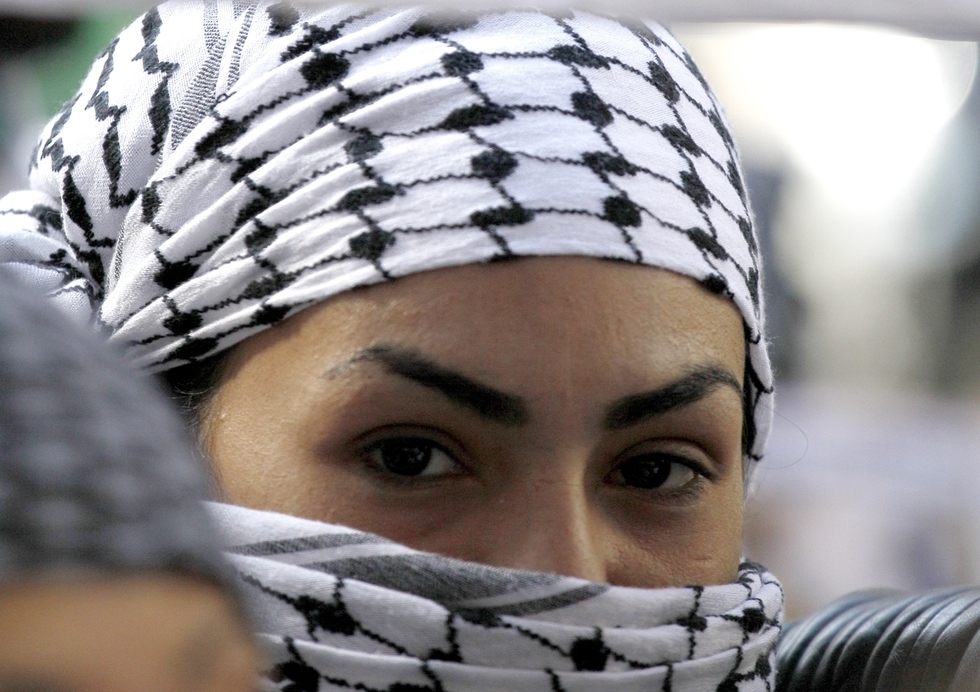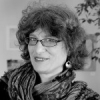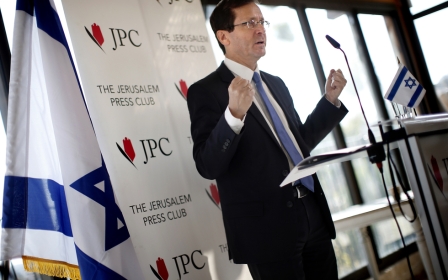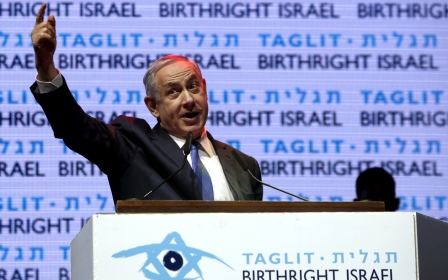No more Mr Nice Guy: White male Israeli activists exploiting Palestine solidarity

As a Palestinian scholar-activist, I am frequently invited to speak at community gatherings or campuses across the nation. Sometimes the email inviting me is quite specific: “We would like to host you in mid-March, and can offer you an honorarium of $250.” Much more often, however, there is hedging around the speaker’s fee. I am asked to name my price, there are no “standards”. I ask for a modest fee that takes into consideration the hosts’ circumstances, and we reach an agreement.
And I generally find out later that other speakers were paid significantly more for delivering a similar talk.
I have discussed this with many friends, all but one women of colour, and we have all expressed extreme frustration at the opacity around this topic. We are also sadly aware of the fact that hegemonic gauges of privilege play out significantly in how much a speaker is paid.
We are generally the speakers who accept the lower honoraria. More seriously, we are the ones who are offered the lower honoraria. Mr Nice Guy, on the other hand, gets the royal treatment. He has a set rate, asks for more than we do, does not negotiate, and gets what he has asked for.
The discrepancy in honoraria is most obvious when activists for justice in Palestine celebrate decent Jews for exactly that - being decent. “Nice” Israeli men are in a class apart, placed on a pedestal, considered heroes for not being violent, racist murderers. In other words, the mere fact that they are decent earns them special status.
Yes, in activist circles, as in corporate culture, straight white men earn more. And we are to blame, for enabling the continuation of oppressive race, gender and class dynamics, even as we organise to change the world, make it more just.
There is no need to name names. Every activist community in just about any city in the US has some experience with the burst of energy that precedes a speaker coming to town. This is when the community scrambles to find a suitable space for the event, rally volunteers to drive the speaker around, and of course, raise the all-important funds.
Do we put up the speaker in a hotel, or can someone offer a guest bedroom? We have to take them out to dinner and cover all their expenses. And, of course, offer them an honorarium.
Or not. And who the speaker is determines that, along with traditional race, gender and class lines.
As I am based in Seattle, I can speak of my experience in this city. Mr Nice Guy contacted our local activists a while back, indicating that he is touring the region, and was interested in speaking in Seattle. In his email, he explained what the cost of his visit would be: he needed a room in a hotel with at least a three star-rating - no motels for Mr Nice Guy, and certainly no solidarity housing. He was asking for a $1,500 honorarium. And then, in addition to the honorarium, Mr Nice Guy wanted a $75 per diem.
This is not a composite portrait, it is what one Mr Nice Guy demanded. An Ashkenazi Israeli, he was touring to promote his book about how he grew up in a Zionist household but overcame his brainwashing, and became a nice guy. For telling us this, he would charge $1,500, and then some.
And the community agreed. In other words, the community agreed to pay a man for telling us he was no murderer.
Much more seriously, the community agreed to let an Israeli man make a living out of saying he does not believe in oppressing Palestinians.
And as I shared this experience with fellow organisers in various parts of the country, many nodded in recognition of an identical pattern in their communities. There are variations on the demands: one “Nice Guy” insisted that we book him a non-stop flight, at an additional $200 over the flight with one-stop. Clearly he did not understand the irony of not wanting to be bothered with a layover, even if he was going to talk about Palestinians spending hours, days, at checkpoints. Another specified that unless he sold a certain number of books, he would need a higher honorarium.
How can this be acceptable? Is Mr Nice Guy not perpetuating his privilege; indeed, is he not shamelessly exploiting the oppression and dispossession of the Palestinian people, by making a living out of denouncing it?
Because Mr Nice Guy does not give back to Palestinians, does not donate his honorarium to a charity that challenges Jewish privilege in Palestine. Mr Nice Guy’s honorarium goes to support Mr Nice Guy’s comfortable living, as a privileged Israeli who can and does travel the world (with no layover) talking about the oppression of Palestinians, and how he would rather have nothing to do with it.
Except that he does. It earns him a living. And we enable that.
And there are many such “Mr Nice Guys” around, speaking on campuses and in church basements, writing books, selling books, autographing their books about their own conscious distancing from their privilege. It is a paradoxical situation indeed.
On the other hand, many Jewish-American women, and Israeli women, seem to “get” the privileged dynamics, and successfully sidestep it. I know a few who give their honorarium back to the community, even some who, upon being invited, actually name a Palestinian woman instead. Anna Baltzer’s essay on the privileging of Jewish voices bears eloquent testament to the fact that one can indeed fully overcome one’s socially assigned privilege.
Other Jewish-American and/or Israeli women speakers make a point of stating that they cannot, will not speak for Palestinians, will not let their voices, their opinions, eclipse those of Palestinian activists. Most of these women do not demand a high honorarium, if and when they are paid at all. And most of these women do not get paid nearly as much as Mr Nice Guy demands.
Palestinians, both men and women, tend to speak for free. We want our story out there. Some, like Omar Barghouti, who do get paid to speak, donate all of their honoraria to the cause. Barghouti also donates all the royalties from his book on the Boycott, Divestment and Sanctions (BDS) movement to BDS organising.
The discrepancy in the treatment of speakers is not only for “community events”. Many Students for Justice in Palestine (SJP) chapters across the nation realised, upon being asked that question, that the highest honoraria they have paid went to Ashkenazi Jewish men. They put them up in better hotels, and take them out to dinner at fancier restaurants. (I have often eaten at campus cafeterias, on a student’s meal plan, so as to save my hosts the cost of a restaurant meal).
The fact that the students need to be asked about this discrepancy before they can actually grasp it, and what it means, where it comes from, is revealing of how much we continue to accommodate entitlement and perpetuate privilege. SJPs have limited budgets, which means that if they spend a certain amount on any one speaker, they will not have much left for other speakers.
And functioning within these restraints, many still offer Mr Nice Guy the highest honorarium. Because he wouldn’t speak for crumbs, like most Palestinians would, who are happy to speak for free, so long as we have an audience.
Mr Nice Guy is not the only one to blame. Why do hundreds want to hear him? Why do hundreds buy his books? Why do we continue to privilege Israeli voices over those of the Palestinians whose bodies are on the line? Why do we allow this to go on, even as we are the ones organising to end predominantly Ashkenazi Jewish privilege, where Palestine is concerned?
Let me be clear: most activists I know give any number of talks for free. On our own dime. We carve time out of our days to drive somewhere, pay our bridge tolls, our parking fees, and give our talk for no compensation, because we believe in the cause. And we will continue to do so.
But we need to issue a “No More Mr Nice Guy manifesto”. Because Mr Nice Guy isn’t stopping by himself, and we are the ones who can put the brakes on this exploitative situation.
- Nada Elia serves on the steering collective of the US Campaign for the Academic and Cultural Boycott of Israel.
The views expressed in this article belong to the author and do not necessarily reflect the editorial policy of Middle East Eye.
Photo: A woman takes part in a pro-Palestinian demonstration on 10 October, 2015 in Paris (AFP).
New MEE newsletter: Jerusalem Dispatch
Sign up to get the latest insights and analysis on Israel-Palestine, alongside Turkey Unpacked and other MEE newsletters
Middle East Eye delivers independent and unrivalled coverage and analysis of the Middle East, North Africa and beyond. To learn more about republishing this content and the associated fees, please fill out this form. More about MEE can be found here.





